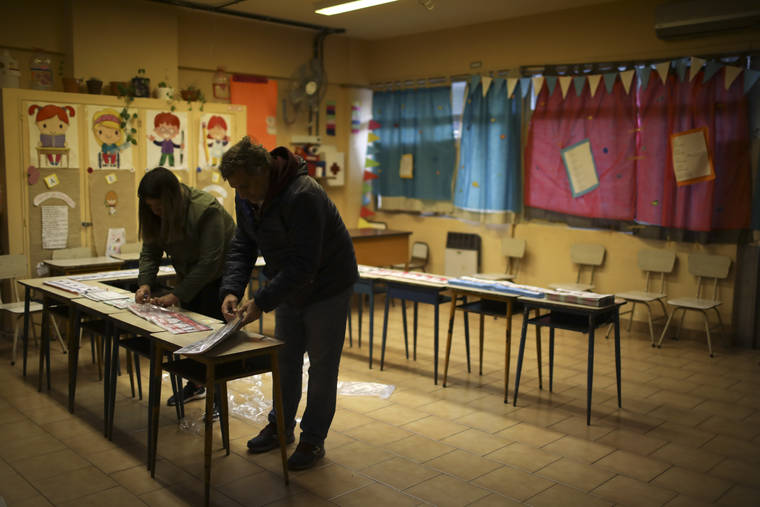BUENOS AIRES, Argentina — A ticket involving former President Cristina Fernández emerged as the strongest vote-getter in Argentina’s primary elections Sunday, indicating conservative President Mauricio Macri will face an uphill battle going into general elections in October.
With nearly 59% of polling stations tallied late Sunday, official results gave the presidential slate headed by Alberto Fernández and his vice presidential running mate, Cristina Fernández, about 47% of the votes. Macri and his running mate, Miguel Ángel Pichetto, had nearly 33%. There were six other presidential slates in Sunday’s elections, with 33.8 million people entitled to vote.
“We’ve had a bad election and that obligates us to redouble our efforts so that in October we will continue with change,” Macri said in a late night address.
The pro-business Macri has the support of financial markets and Washington, but has lost popularity amid discontent over austerity measures and low growth. He says he is taking the necessary, painful steps to get the economy going after 12 years of leftist populism under Cristina Fernández and her predecessor and late husband, Nestor Kirchner.
Primaries in Argentina are held simultaneously and obligatory voting made Sunday’s contest effectively a litmus test test for the Oct. 27 presidential election since the main parties have already chosen their nominees.
Alberto Fernández was Cristina Fernández’s chief of staff during her initial term in 2007-2011, but many interpret a vote for their ticket as a vote of confidence for the former leader, who has a reliable base of supporters. The two are not related.
Cristina Fernández says Macri must be defeated so they can fight the poverty and homelessness she blames on his policies. She faces a series of trials for corruption during her 2007-2015 administration, allegations she denies.
“After the primaries we will convoke all Argentines to unite to resolve the infinite problems that we have,” Alberto Fernández said after casting his ballot.
Analysts were awaiting final tallies to determine the margin of victory between the two leading candidates, but the wide spread revealed the considerable depth of Macri’s weakness, potentially positioning the Fernández team to win in the first round of voting.
To be elected president in Argentina in the first round, candidates need to finish first with at least 45% of the votes or have 40% and a greater than 10-point advantage over the nearest rival. If no candidate wins outright in October, there will be a November runoff.
Luis Tonelli, a political science professor at the University of Buenos Aires, said he hasn’t seen an electoral process “this close and with this much uncertainty” since Argentina’s seven-year military dictatorship ended in 1983. He described it as “a tossed coin hanging in the air.”
Former Economy Minister Roberto Lavagna trails far behind the two front-runners. He received 8.4% of votes. Parties that get less than 1.5% of the overall votes cast in the primary won’t appear on the October ballot.
“I think that with a government of Macri and Pichetto we are going to advance,” said Ayde Amra, who is retired, referring to her support for Macri and his running-mate Miguel Ángel Pichetto.
But Emiliano Marson, who supports the Fernández formula, said Argentina should “have politics for the people and not for foreign capital like we are doing at the moment.”



